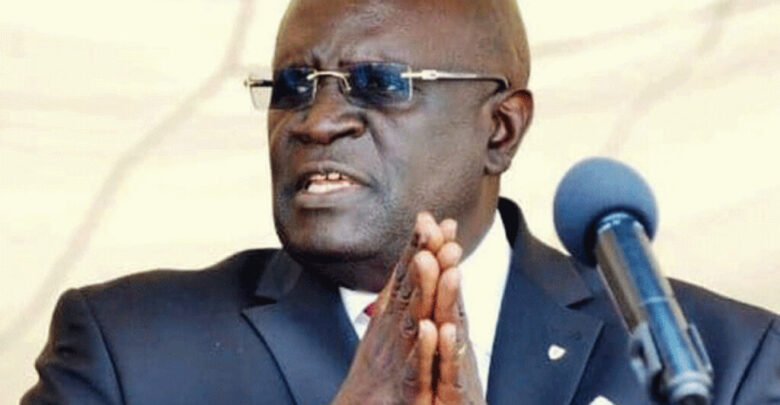

NAIROBI, Kenya — Dorcas Wanjiru Kiarie pushes a bag of vegetables aside and opens the door to her grocery shop in Kawangware, an informal settlement in Kenya’s capital, Nairobi.
Her three-year-old son cries for attention, but a sweet or biscuit will calm him.
Her bigger cause of worry, however, is her firstborn daughter Susan Kiarie, 14, joining Saint Anne’s Girls’ Secondary School, and Jayden Kiarie, 10, joining Grade Four at Kawangware Primary School.
On average, Kiarie makes about two dollars profit daily, just enough to feed her family of five.
“I struggle financially with the little money I make, but the Covid-19 pandemic has worsened the situation,” she told Zenger News.
“It’s hard to pay school fees, rent, and afford a meal.”
The school fee is about $200 per term.
The Covid-19 pandemic has hit the Kenyan economy hard and for many people, affording a meal, let alone school fees, is a struggle.
A November 2020 World Bank report indicates that the pandemic has pushed an estimated two million people into poverty in East Africa’s largest economy.
Fewer Kenyans can now access healthcare, and only three in ten households seek medical attention compared to the period before the pandemic, said the report.
Her husband, John Kamau Kiarie, 34, lost his job as a driver at a Mombasa-based five-star hotel when the number of tourists coming to Kenya dwindled due to the Covid-19 pandemic.
“I used to make enough money before the pandemic, and I was sure my family would enjoy a relatively comfortable life,” he told Zenger News.
“But from last year, things hit rock bottom. I parked my van. There have been so few arrivals that many drivers like me lost jobs, income, and hope.”
A United Nations World Tourism Organization report indicates that tourists arrivals through Kenya’s largest airports, Jomo Kenyatta International Airport in Nairobi and the Moi International Airport in Mombasa, declined sharply since March 2020.

Schools across Kenya reopened on July 26, 2021, for a new academic year, which is unusual for many parents who used the regular January-December academic calendar, disrupted by the Covid-19 pandemic.
When Covid-19 struck in March 2020, the government closed learning institutions, and students stayed home for two terms.
As the schools reopened in January 2021, the Ministry of Education readjusted its calendar such that holidays will be as short as four days to recover lost time.
Parents of students in private schools and government boarding secondary schools now shoulder the burden of paying fees back-to-back.
In downtown Nairobi, parents queued in shops to buy books and uniforms.
Although Education Cabinet Secretary George Magoha said the government would provide textbooks, parents claim they incurred extra costs from school heads. There will be four terms in one year compared to the usual three to cover time lost in 2020 due to the pandemic.
Margret Wekesa, 41, a parent of three schoolchildren in Nairobi, has stretched her budget, spending more than $1,000 on books, uniforms, and other expenses.
“I must find an additional source of money since there are adjustments in the school calendar, meaning parents will pay more,” she told Zenger News.
“I will also source food from the village instead of buying from the city so that I save more.”
As the schools reopened, the government released some $546,961,324 for secondary school capitation and another $139,963,167 for the primary schools.
Magoha called on school heads to come to an arrangement with parents for staggered fee payment.
“I urge parents who can pay the whole amount to pay so that the schools continue running normally,” he told Zenger News.
However, non-boarding learners are not to pay any fee. According to government regulation, public day schools only pay for lunch expenses, but private schools have their own structures.
There was a one-week holiday for learners before the opening of the first term.

Most schools charge a one-off fee when students join a new grade, meaning parents have to dig deeper into their pockets.
The Ministry of Education sets $450 as the maximum school fees payable for boarding schools, but most schools charge extra levies to cater to water, electricity, expansion, and maintenance.
“The ministry has scaled down the number of weeks in a term from 39 to 30, subsequently reducing the amount of fee paid,” Magoha told Zenger News.
“We appreciate the ministry for setting guidelines that are a big relief to parents,” Francis Mutembei, the deputy principal at Saint Josephs Secondary School in Meru County, told Zenger News.
“But looking at all aspects of learning, it is almost impossible not to ask for extra money, for instance, to hire more teachers.”
As part of Covid-19 safety measures, the government encourages the setting up of handwashing points in private schools— an extra burden for parents as the costs are usually passed on to them as a one-time payment.
However, the ministry of education is urging school heads to negotiate with parents to pay fees in bits without interrupting learning sessions by sending them home.
(Edited by Kipchumba Some and Anindita Ghosh)
The post School Fees Pain For Kenyan Parents As Covid-19 Pandemic Bites appeared first on Zenger News.





